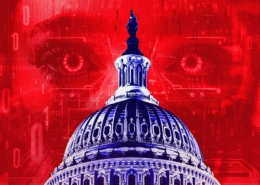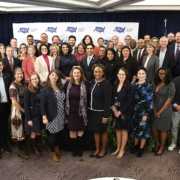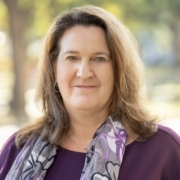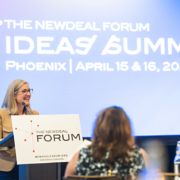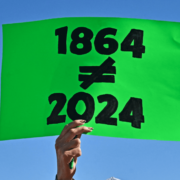Politics: An Honorable Profession
By Debbie Cox Bultan
CLICK TO READ THE FULL ARTICLE
A recent ChatGPT query of “What are the five most common words used to describe politicians?” yielded the following results, in order: corrupt, opportunistic, charismatic, manipulative, and incompetent. (Ouch.)
By contrast, the same query applied to “business executives” returned the words visionary, ambitious, strategic, influential, and successful. Academics? Knowledgeable and innovative. News media resulted in a mixed bag.
While a ChatGPT query isn’t a public opinion poll, the results probably don’t surprise you. Denigrating politicians is practically a national pastime, ingrained in our popular culture. Even Taylor Swift, who does great work encouraging people to vote and is one of my favorite artists, takes a lyrical swipe at them in her recent hit “Anti-Hero”: “Did you hear my covert narcissism/I disguise as altruism/Like some kind of congressman?”
There is no doubt that the volume and nastiness of our political discourse has objectively gotten worse in recent years. Former President Donald Trump has escalated the divisiveness to dangerous levels, but he did not invent political attacks. His ugly rhetoric about anyone who disagrees with him, from either party, comes on the heels of a message repeated deliberately over the last 30 years: that government itself is the enemy, and the people who serve in government can’t be trusted. It’s no wonder, then, that so many of our fellow Americans are ready to say “to hell with all of them.”
Cruel and destructive behavior by candidates and elected officials is never okay. But we also need to understand that those who do increasingly unhinged things to get attention are not just the minority—they are an infinitesimal sampling.
Nationally, there are more than 519,000 elected officials. Just 537 serve at the federal level. The rest are state and local officials, working to solve the challenges and seize the opportunities facing towns, cities, counties, and states across America.
And as we grapple with a pervasive erosion of our civic culture and a serious crisis of democracy, I believe it is far past time for us to call out the unfair stereotypes of elected officials, put aside the cynicism, and celebrate and respect the women and men who step up to run for public office. Until we do, we are doomed to be stuck in an echo chamber of cynicism toward our government and our politics that is in large part of our own making.
Ihave been privileged in my career to have a front row seat to the people, policy, and politics of our country. Arriving in Washington, D.C., in 1990 for an internship on Capitol Hill, I was inspired to find that most people actually woke up every day thinking about how they could make the world a better place.
Since then, I have worked with elected officials at all levels of government, including as founding CEO of the NewDEAL (Developing Exceptional American Leaders), a nonprofit that works with a network of effective, moderate Democratic state and local officials from nearly every state. We have interviewed dozens of them for our podcast, titled “An Honorable Profession” in homage to Robert F. Kennedy’s belief that politics is just that.
Over more than 30 years, my foundational belief in the basic decency of the vast majority of our elected leaders has not wavered. In fact, it has been continuously reaffirmed by the many conversations I’ve had with policymakers about their public service. Most of what I hear contradicts cynical conventional wisdom, and reminds me every day of who our elected officials are and the critical role they play in our society. Here are five truths I’ve learned:
1. People run for office because they want to make a difference.
In a Pew Research Center survey of Americans’ views on the state of our political system conducted in July 2023, researchers found that “Self-interest—whether in the form of making a lot of money, potentially running for a higher-level office later, or gaining fame and attention—is widely seen as the motivating force for all or most elected officials. In contrast, just 15% of Americans think all or most elected officials ran because they wanted to serve the public.”
My experience with elected leaders brings me to a very different conclusion.
My favorite question to ask on our podcast is why someone ran for office the first time. The answer is almost always a variation on the theme that they wanted to make a difference. To right a wrong. To ensure someone else does not have to experience a struggle they overcame. To give back. Often it’s a deeply personal story that propels people into government service.
Take Will Jawando, a Montgomery County, Maryland councilmember. Mostly raised by a single mom in an “extremely low-income [household]…in the midst of abundance,” Councilmember Jawando understood that it was access to things like a good education and transportation options that made the difference in putting him on a path to success, unlike some of his peers. He ran for office to expand opportunity for all, as exemplified by his work in office to create a Child Investment Fund (or “baby bonds”) to give young people in his county a head start on savings for education, training, or to start a business, as well as his efforts to ensure that formerly incarcerated individuals are not discriminated against when applying for jobs.
In Vermont, a young lawyer who was serving as an assistant district attorney, Molly Gray, was fortunate to be able to take time off to care for her mother when she experienced a significant health emergency. But despite Gray’s education and privilege, she could just barely make it work financially—and she knew that many people in the same situation would not be able to. It was her awareness of that problem that propelled her to run for and win a race for lieutenant governor in 2020 with a goal of passing paid family leave in her state.
Zach Wahls was only 20 when he testified before the Iowa House Judiciary Committee in defense of marriage equality and his “two-mom” family. Seven years later, he was elected to the Iowa Senate on a pledge to give a voice to all, including nontraditional families like his own.
In my experience, stories like these are the norm of why people choose to run for office.
2. Politicians are people, too.
As the self-appointed cheerleader-in-chief for state and local elected officials, I often talk about the heroic nature of the work. Of being on the frontlines of so many important issues—from educating our children and building affordable housing to combating climate change and defending our democracy.
But the truth is that elected officials are neither heroes nor villains. They are people just like you and me who have chosen to serve in public office.
In a representative democracy, we elect the people who will take up our ideas and concerns in government. This is the fundamental idea of our founding: Elected officials are the “by the people” in the phrase “a government of the people, by the people, and for the people.”
The elected officials I know come from every walk of life. They are teachers, lawyers, nonprofit leaders, small business owners, military personnel, computer scientists. The list goes on, and they are often still working other jobs while they serve in office. Secretary of Transportation Pete Buttigieg was famously deployed overseas in Afghanistan while serving in the U.S. Navy Reserves during his tenure as mayor of South Bend, Indiana.
The elected officials I know share our interests. They are musicians, athletes, parents, volunteers, and so much more. Former Florida State Senator Loranne Ausley competes in Ironman triathlons. Tim Keller, mayor of Albuquerque, New Mexico, is a heavy metal fan. Georgia’s former House Minority Leader and gubernatorial candidate Stacey Abrams is also a novelist, and Columbus, Ohio’s Zach Klein refereed Division I NCAA women’s basketball while on the city council.
The elected officials I know, women and men, share the challenges of balancing work and family, often having to get by on very small salaries. Many elected officials across the country work multiple jobs to make ends meet, despite the heavy demands of their public service. Until last year, the mayor of Brownsville, Texas earned no salary, and 25 states pay their legislators less than $25,000 a year.
3. Politicians take their job to represent us seriously, and representation matters.
Once elected, the people I talk with work hard to ensure they represent their constituents, understanding the responsibility that comes with the office.
Take Will Haskell, who ran for office from his college dorm room and in 2019 became the youngest person ever elected to the Connecticut Senate. Decades younger than most of his colleagues, Will was the only sitting senator who was a renter, and the only one to have experienced active shooter drills as a student. By having a seat at the table, Will helped give voice to the experiences of thousands of other young people across his state during important policy debates and discussions.
Cavalier Johnson, the first Black mayor ever elected in his hometown of Milwaukee, Wisconsin, shared on our podcast how he brings his experience of poverty and housing insecurity as a child to his leadership for the city. It guides his work to ensure that good-paying, family-supporting jobs and lifelong workforce development opportunities are available for his residents. The mayor also noted how vital it is for people to see themselves in their leaders: “It’s important for young people to see me because they should be able to see their reflection in the highest office in the city. They should be able to see their reflection in all places.”
Delaware Senator Sarah McBride, currently the highest-ranking transgender elected leader in the country and a candidate for the open congressional seat in her state, has championed policies like expanding telehealth and paid family leave. As she put it: “One reason representation is so important is that it changes the conversation. It changes priorities. And it changes policy.”
While there is still a long way to go to have elected representation across the country that looks like America, progress is being made. I am inspired by the leaders who are making history—and, even more importantly, solving problems in their communities and delivering for their constituents.
4. Politicians get good stuff done.
Despite the word “incompetent” appearing among the top five in ChatGPT’s response to my query, the elected officials I work with get good things done for their constituents. If politicians run for office because they want to make a difference, being in office allows them to do so.
I love talking to guests on our podcast about their proudest accomplishments, which collectively impact millions of people across the country.
Many leaders campaign on change and are able to deliver. New Mexico Secretary of State Maggie Toulouse Oliver worked to pass the New Mexico Voting Rights Act and Election Infrastructure Bill to expand ballot access while enhancing ballot integrity. Shelby County, Tennessee Mayor Lee Harris reduced barriers to quality health care for his residents, partnering with the University of Tennessee Health Science Center College of Medicine on “ShelbyCares,” which offers free screenings, health and nutritional coaching, and group exercise classes in historically underserved communities. Albany Chief City Auditor Dorcey L. Applyrs has made city government more transparent and accountable by creating a regular “Community Download” program, where she talks with various city officials to help residents better understand how their government works. She has also undertaken the first ever “equity audit” to identify inequities in institutional policies, practices, and culture that have produced different outcomes for different constituencies.
Elected officials also use their experiences to shape their policy agendas. Kate Gallego, now the mayor of Phoenix, experienced a seizure when she was first elected to the Phoenix City Council, resulting in her having to rely exclusively on public transportation for several months. After seeing firsthand the challenges facing the city’s transit system, she spearheaded the Phoenix Transportation 2050 plan—a bipartisan, voter-approved project that is providing residents with expanded bus service and light rail, a mobile fare-collection system, and other improvements, particularly in historically underserved communities.
Nevada Assemblywoman Sandra Jauregui was at the Route 91 Harvest Music Festival near Las Vegas when a gunman opened fire in what became the deadliest mass shooting in modern U.S. history, with 60 people killed. As a survivor, the assemblywoman has become an advocate of commonsense gun-safety legislation in her state, championing bills to prohibit firearms at polling locations, strengthen “ghost gun” laws, and raise the age for the purchase and possession of assault weapons.
These stories of success are the norm among the elected officials I know, not the exception.
5. It is not easy to be an elected official.
Often overlooked in the way we dismiss politicians is how hard it is to do their job, particularly in our current political environment.
Signing up to run for office means that you are in the public spotlight, with very little privacy. In many cases, salaries are low or even nonexistent. People have an opinion about what you are doing wrong and are not afraid to share it. And in making decisions or casting votes, you inevitably make some people mad. All of this has long been true, and elected officials don’t complain.
But in recent years, with the vitriol on social media and the rise of political violence, too many elected officials have had to endure unacceptable treatment. Elected leaders are now facing ugly smears online, people showing up at their homes, and even death threats. In Kansas, law enforcement thwarted a kidnapping plot against then-Wichita Mayor Brandon Whipple; the man who was arrested in the case was angry over the city’s mask mandate during COVID-19. This was not an isolated incident, and in this environment, I worry that good people will choose not to run.
Hopefully I’ve persuaded you that the stereotypical version of a politician is not the full story. We all need to be aware of how we either perpetuate or help improve the image of elected officials today. The next time you are about to dismiss all politicians as corrupt or incompetent, I hope you will pause and think of the hardworking, effective leaders around the country.
My challenge to you is this: Share the good stuff when you see it. Retweet or post stories about politicians when they do good things, like Pennsylvania Governor Josh Shapiro reopening a section of Interstate 95 in Philadelphia a remarkable 12 days after it collapsed. Or the elected officials of both political parties who stepped up to save our democracy in the 2020 election. Or the passage of a government program that provides affordable housing or child care or school lunches in your community.
Support your elected officials with your words, your time, or a contribution. When you meet your local elected official at the grocery store late at night, maybe even say thank you. When you disagree with them, do so respectfully and civilly. Or choose to run for office yourself.
The health of our democracy depends on good people getting into politics. It depends on good people stepping up to run for and serve in elected office. The good news is, despite public perception, they already are. Let’s make sure that continues to be the case.
